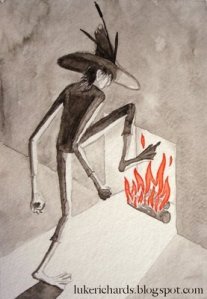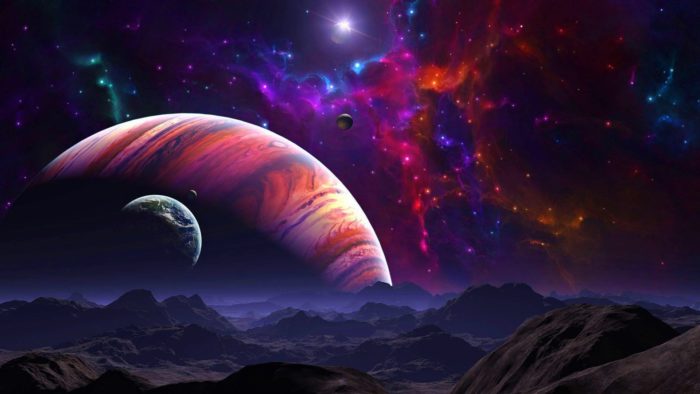Dreams of Other Worlds
What I’ve written here is an acknowledgment of the power of fiction and the presence of God wrapped in a type of emotional appeal, an appeal that starts with talking about dreams. Note that I’m not limited to making emotional appeals when I talk about God—I also can make an intellectual case, as I did writing for Speculative Faith with my “Car-Universe Without a Motor” series. But note also that unlike someone who is convinced human beings are nothing more than a product of evolution, for whom emotion has no deeper meaning (much of it supposedly a leftover from our so-called “reptile brain”), a believer in God has grounds to think emotions as well as reason matter in their proper context–that emotion can bring a person to acknowledgement of truth. God created feelings as much as rational capacities and each have the power to point the way back to their Creator.
My emotions were wrapped up in a vivid dream I had as a child in which I extended my arms and a strong wind wrapped around me and lifted me into the sky. The wind followed me, like Elijah perhaps, and whirled around me. But unlike Elijah, who went where the Lord directed him, the wind in my dream carried me wherever I wanted to go, me tilting my arms like a bird to fly wherever I wished.
I awoke from the dream saddened by its loss—but determined to retain that memory forever. I of course only partially succeeded. Now it’s just a faded memory of a memory, drained of all its color, but still retaining a very small portion of its power.
Recently I had a similar dream, of being an acrobat of such effortless skill that my leaps and twists In the air didn’t drain me of energy and left me hanging upward long seconds before coming back to ground. This is of course something I’ve never actually done and probably could not ever do the way I dreamed of it even if I had trained to be an acrobat from my childhood—at least not in the gravity of Planet Earth. On the Moon, or “a” moon, such activity would be much easier.
There’s something in me that is not limited to a desire to fly—or leap—and wishes it could be in a world other than my own. I want to see alien stars. And vistas. And explore strange worlds.
Speculative fiction taps into some of these desires, doesn’t it? We with our protagonists via our imaginations get to hunker down on the neck of our trusty dragon as it glides through the air.

Image credit: Mediablix https://www.videoblocks.com/video/riding-a-dragon-over-snowy-mountains-pov-b-_2tt_2xj0u9zep3
Or we can maneuver our starship to the place we see the entire galaxy stretched out before use like a gem-studded tapestry. Or many other things.

Image Copyright: Tania Gabrielle
Why do I dream of walking on the Moon or other moons? Why do I long to see alien stars?
Why, if I am the supposed product of vast ages of evolution, would I not be much more automatically focused on my own survival, much more interested in keeping myself alive? Why do I long for beauty? And not just the familiar beauty of things I’ve seen, but also the beauty of things I have never seen? The thrill of experiences I’ve never had?
Could it be that fiction that steps out of the world we live in on a daily basis has the power to point out that this world, the one we reside in, is not enough for us? That we long for more because more must surely exist? That we long for a form of eternity and transcendence because God has stored up these things for those in a relationship with Him? That these treasures can be found in a spiritual sense in this life but also in a very literal sense in the next?
Speculative fiction can do much more than point the way to unseen beauty—it can even do harm, by glorifying evil and mocking that which is good. But heroes who stand of for what is really right and true in fiction reflect the genuine struggle that exists between good and evil, a struggle that’s not limited to events our human eyes can see during our earthly lifetimes.
A hero I have never met, because he never existed, of a species which never existed, faced a villainess who tried to overwhelm all sense of anything the group could see beyond the Underworld. “There is no sun” she said, strumming music as she enchanted them. She told them the sun was something they imagined based on lamps, that Aslan was something they imagined based on housecats, that the very “Overworld” was simply a product of their imagination, that the world around them of underground caverns was all that existed. All that had ever existed.
The hero stomped on a fire, burning his marshwiggle flesh, and said, in part:

Credit: lukerichards.blogspot.com
“All you’ve been saying is quite right, I shouldn’t wonder. I’m a chap who always liked to know the worst and then put the best face I can on it. So I won’t deny any of what you said. But there’s one thing more to be said, even so. Suppose we have only dreamed, or made up, all those things—trees and grass and sun and moon and stars and Aslan himself. Suppose we have. Then all I can say is that, in that case, the made-up things seem a good deal more important than the real ones. Suppose this black pit of a kingdom of yours is the only world. Well, it strikes me as a pretty poor one. And that’s a funny thing, when you come to think of it. We’re just babies making up a game, if you’re right. But four babies playing a game can make a play-world which licks your real world hollow. That’s why I’m going to stand by the play-world. I’m on Aslan’s side even if there isn’t any Aslan to lead it. I’m going to live as like a Narnian as I can even if there isn’t any Narnia.”
Our longing, our dreams of other worlds are worth having, our God is worth following, even if we had no rational grounds to believe in our God or in the real existence of a life after this one. We do have a number of logical grounds, but even if we didn’t, our dreams, our so-called play-world, as Puddleglum said, “licks the real world hollow.” So we should live then for that “play-world,” for its values and the values of its Master, and not for this grungy world of grubbing to survive, advance, and dominate. And the very best speculative stories have tremendous power to remind us of that.
Let this perspective on dreams of other worlds shape what you write, my friends.








































Our creativity is likely a by product of our ability to think abstractly and therefore strategically. We can imagine all the possibilities (even the crazy, wild ones we use for fantasy stories) and that helps us come up with plans for survival. Atheists would probably use that to discount God, but I simply see it as part of the way things are, or proof that creativity IS useful.
Interestingly enough, I’ve listened to a documentary or two that indicated one thing scientists look for when digging up campsites of prehistoric humans are signs of religion. Such signs indicate an ability to understand and ponder abstract thoughts. I think they even said that one reason they thought neanderthals were unintelligent was the initial lack of religious and burial items.
What I haven’t heard a good explanation for is why beauty matters as much to humans as it does–which indirectly relates to our imagination. Imagining things that help us survive is perfectly reasonable. But why do humans spend so much time thinking about (and longing for) beauty? Why do we desire such things, especially when they don’t help us survive?
That God made us that way is a much more reasonable answer than anything based on the universe supposedly just doing its thing.
Some would say it has to do with our sense of what is admirable/healthy/safe. Like, when choosing a spouse, people are wired to pick someone with admirable abilities and/or good looks because that will ensure a safe family environment and healthy children. A person that is ‘ugly’ would be more likely to have a bad genetic condition or something(In theory. Obviously this isn’t always the case, but it’s probably why the instinct exists). As for beauty in terms of landscapes and all that, maybe we’re more biased toward lands that are plentiful(green, lush, and full of resources) because that will help us survive. Our current perception of beauty could have grown out of that.
In some ways, I think our perception of beauty has progressed even further, because we can even admire things that COULD hurt us (deserts, predatory animals, etc). But even that aids us because it helps us come to terms with/be happy with things that would otherwise make us miserable and less interested in surviving. As far as our admiration for predators, that exists so we will take time to understand how to evade those predators better than we would have otherwise. Also, predators like lions have traits we admire and need (such as speed and strength)
So…I think it’s both. God made us this way, but he made us this way for lots of reasons. God is practical, so he gave us traits that help us survive in ways we don’t even realize.
Admiring lush landscapes makes sense–but only admiring that sort of thing is not how humans actually are. We are as much (or nearly as much) impressed with lanscapes that have no survival value–glaciers, canyons, high mountains, etc.. We ooh at pictures of Pluto for cripes sake. And this isn’t just a modern cultural phenomenon thing. Artwork portraying the beauty of landscapes totally inhospitable to humans is ancient.
Humans have to got to attend survival training. Our instincts are only occasionally correct on how to stay alive.
Yes, a struggle for survival has shaped how humans act in many ways–but we have impulses towards beauty that I think are simply inexplicable by any of the attempts to pound-the-beauty-really-means-survival square peg into a round hole.
Eh, I think survival traits are tools, just like hammers. We need hammers for pounding in nails and whatnot, but that doesn’t mean we aren’t ever going to slip up and smash our fingers with them. And then, of course, survival traits are good for handling certain situations, but not others. A good hammer doesn’t make a good flyswatter, as my Dad likes to say.
That is such a dad thing to say
Yep 🙂
Think about your analogy though–is it really true our love of beauty primarily helps us survive but we sometimes (or even often) misuse it?
Or is it true that love of beauty is instinctual and has no clear connection to survival–and in fact in order to survive we have to stop thinking about the lovely landscape and instead deliberately direct our brains to where we’ll find food and water?
People say beauty enhances survival because that’s doctrinal to Darwinism. It even makes a small amount of sense in mate selection. It makes no sense at all in describing other kinds of beauty, like landscapes and many other things…or else people would instinctively find Antarctica ugly–and we DON’T.
I don’t know about primarily, but it does to an extent. Or, at the very least, it’s something that CAN be useful for survival whether or not that’s what it was designed for. We have a lot of tools in our arsenal, but we can use them for pretty much whatever. Our legs are useful for helping us travel to find food or run from danger, but that doesn’t mean we won’t walk to the pantry to get another helping of extremely unhealthy donuts. Or accidentally walk toward something that’s dangerous.
Our sense of disgust probably functions like beauty in some ways, in terms of shaping what we like and don’t like. We need to see things as disgusting sometimes because it helps us avoid germs, or harmful traits. So disgust repels us from bad things, and beauty is supposed to attract us to good things. Obviously that won’t always manifest in a perfect way, because even if we are born with disgust and beauty, we still go through a process that learns to associate certain things with disgust/beauty. And that process depends on how outside information interacts with our innate personality traits.
There’s times when we have to stop thinking about food and water so we can find shelter from storms or predators (or so we can sleep). But then we have to turn that off so that we can meet other needs, like chores and foraging. But then there’s times when we should turn the daily responsibilities off and focus on beauty and fun and such because that gives us a chance to focus on finding a spouse, learning something new, or reducing stress. And that rest period is just as important as finding food, because it lets us recover and gives us a different context to invent solutions in.
So, just because we have to shut something off to move on to the next survival thing doesn’t negate its use. Everything is best used in its own place and time.
What is your concern for this, though? Are you worried about giving points to evolution, or moreso just invested in beauty being an intrinsic thing instead of a useful one?